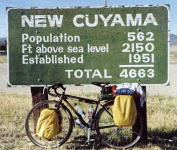Further to my reflections on getting movies from digital still cameras, here’s an example of the way the boundaries between devices is blurring. My Canon IXUS, like many compact digital cameras, has a movie mode. If you use it to record movie clips, then iPhoto neatly collects them and keeps them in its library, where they’re stored as .avi files. Double-click on a movie clip and OS X launches QuickTime player, enabling one to view the clip.
So far so good. But if you launch iMovieHD then you can drag .avi clips from the iPhoto library onto the editing timeline. The software converts them to DV on the fly. (In the old days, you had to open them in QuickTime Pro and convert them to DV files, but now it all seems to be built into iMovieHD.)

I’ve just tested this by making a complete little film from movie clips and images taken using the IXUS in Provence last year. It was as easy as pie. I’d post it to YouTube were it not for the fact that the soundtrack is from a Leo Kottke album and therefore not my property.
I’m sure you can do all this using Windows, but I’ll bet the tools aren’t as integrated as they are on OS X.
I should also add that it was Quentin who, unwittingly, started me off on this line of thought. He too has an IXUS.





